A Report on Sustainability Performance of Tesco's Supply Chain
VerifiedAdded on 2023/06/08
|12
|3555
|273
Report
AI Summary
This report provides an overview of Tesco's sustainability performance within its supply chain, highlighting the importance of sustainability in business and the challenges faced by Tesco in achieving its sustainability goals. It discusses the impact of business on the environment and society, emphasizing the need for sustainable practices such as using sustainable materials, optimizing the supply chain to reduce emissions, and investing in renewable energy sources. The report also addresses issues such as poor sustainable performance, difficulty in monitoring complex supply chains, governmental conflicts, and the high investment costs associated with implementing sustainable practices. It concludes by emphasizing the need for businesses to prioritize sustainability for long-term profitability and ethical responsibility.
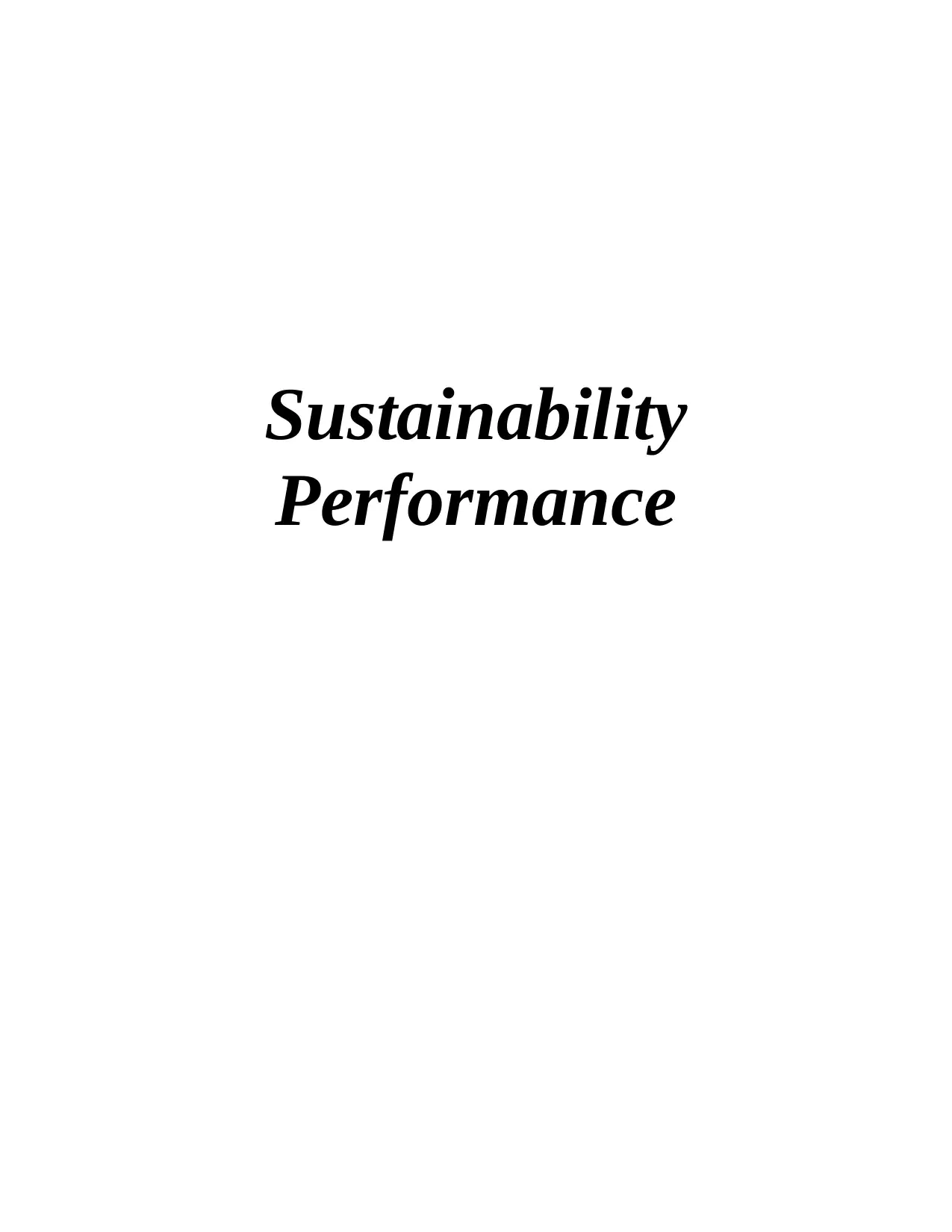
Sustainability
Performance
Performance
Paraphrase This Document
Need a fresh take? Get an instant paraphrase of this document with our AI Paraphraser
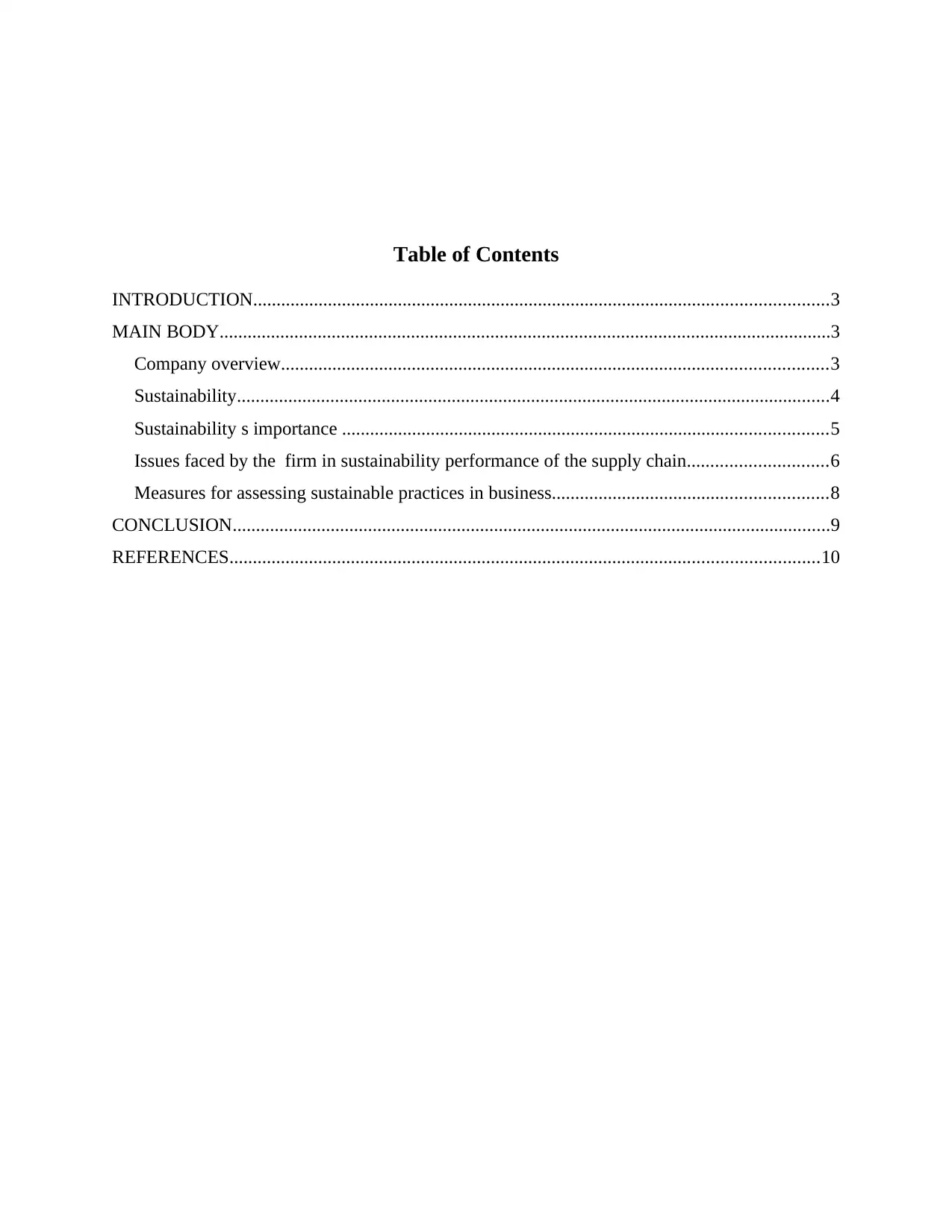
Table of Contents
INTRODUCTION...........................................................................................................................3
MAIN BODY...................................................................................................................................3
Company overview.....................................................................................................................3
Sustainability...............................................................................................................................4
Sustainability s importance ........................................................................................................5
Issues faced by the firm in sustainability performance of the supply chain..............................6
Measures for assessing sustainable practices in business...........................................................8
CONCLUSION................................................................................................................................9
REFERENCES..............................................................................................................................10
INTRODUCTION...........................................................................................................................3
MAIN BODY...................................................................................................................................3
Company overview.....................................................................................................................3
Sustainability...............................................................................................................................4
Sustainability s importance ........................................................................................................5
Issues faced by the firm in sustainability performance of the supply chain..............................6
Measures for assessing sustainable practices in business...........................................................8
CONCLUSION................................................................................................................................9
REFERENCES..............................................................................................................................10
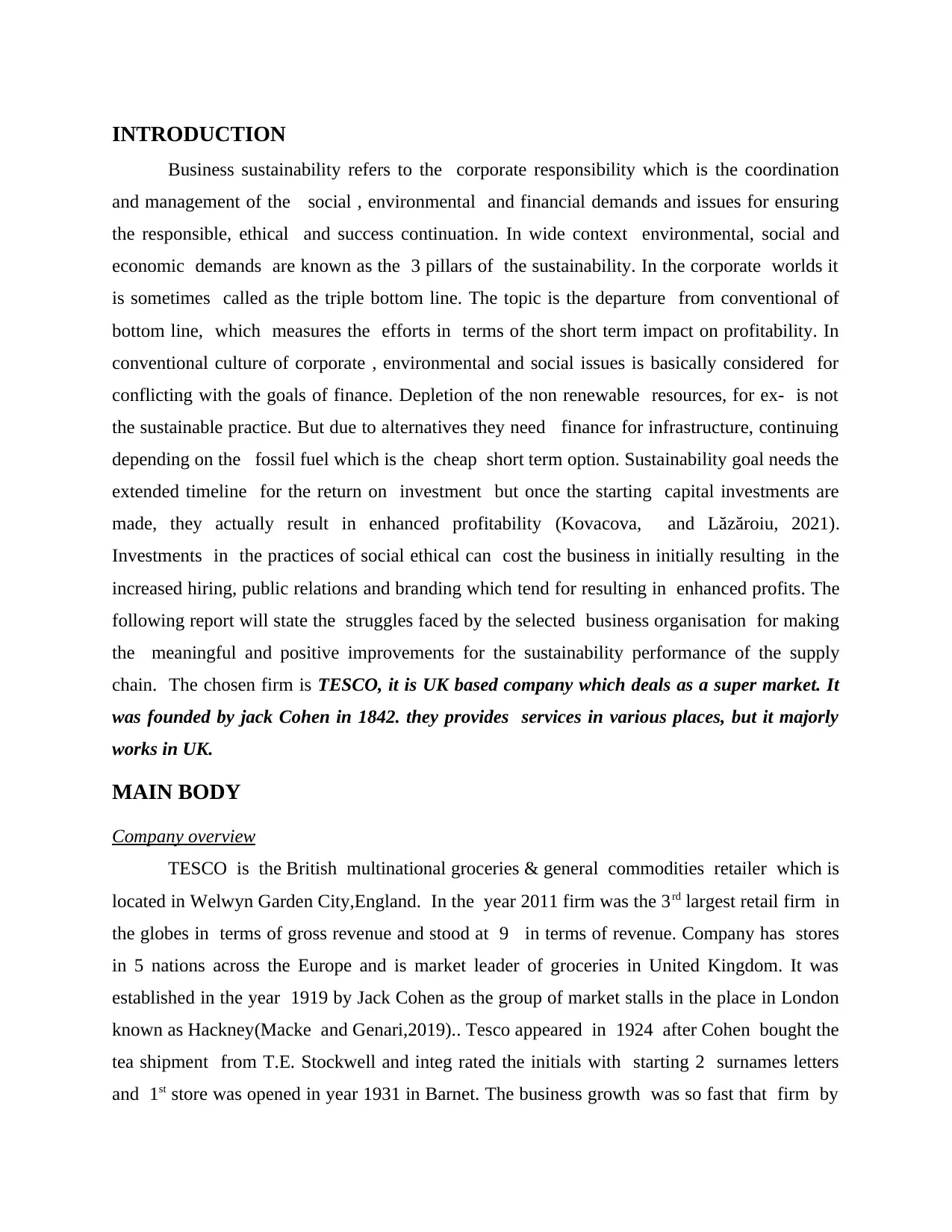
INTRODUCTION
Business sustainability refers to the corporate responsibility which is the coordination
and management of the social , environmental and financial demands and issues for ensuring
the responsible, ethical and success continuation. In wide context environmental, social and
economic demands are known as the 3 pillars of the sustainability. In the corporate worlds it
is sometimes called as the triple bottom line. The topic is the departure from conventional of
bottom line, which measures the efforts in terms of the short term impact on profitability. In
conventional culture of corporate , environmental and social issues is basically considered for
conflicting with the goals of finance. Depletion of the non renewable resources, for ex- is not
the sustainable practice. But due to alternatives they need finance for infrastructure, continuing
depending on the fossil fuel which is the cheap short term option. Sustainability goal needs the
extended timeline for the return on investment but once the starting capital investments are
made, they actually result in enhanced profitability (Kovacova, and Lăzăroiu, 2021).
Investments in the practices of social ethical can cost the business in initially resulting in the
increased hiring, public relations and branding which tend for resulting in enhanced profits. The
following report will state the struggles faced by the selected business organisation for making
the meaningful and positive improvements for the sustainability performance of the supply
chain. The chosen firm is TESCO, it is UK based company which deals as a super market. It
was founded by jack Cohen in 1842. they provides services in various places, but it majorly
works in UK.
MAIN BODY
Company overview
TESCO is the British multinational groceries & general commodities retailer which is
located in Welwyn Garden City,England. In the year 2011 firm was the 3rd largest retail firm in
the globes in terms of gross revenue and stood at 9 in terms of revenue. Company has stores
in 5 nations across the Europe and is market leader of groceries in United Kingdom. It was
established in the year 1919 by Jack Cohen as the group of market stalls in the place in London
known as Hackney(Macke and Genari,2019).. Tesco appeared in 1924 after Cohen bought the
tea shipment from T.E. Stockwell and integ rated the initials with starting 2 surnames letters
and 1st store was opened in year 1931 in Barnet. The business growth was so fast that firm by
Business sustainability refers to the corporate responsibility which is the coordination
and management of the social , environmental and financial demands and issues for ensuring
the responsible, ethical and success continuation. In wide context environmental, social and
economic demands are known as the 3 pillars of the sustainability. In the corporate worlds it
is sometimes called as the triple bottom line. The topic is the departure from conventional of
bottom line, which measures the efforts in terms of the short term impact on profitability. In
conventional culture of corporate , environmental and social issues is basically considered for
conflicting with the goals of finance. Depletion of the non renewable resources, for ex- is not
the sustainable practice. But due to alternatives they need finance for infrastructure, continuing
depending on the fossil fuel which is the cheap short term option. Sustainability goal needs the
extended timeline for the return on investment but once the starting capital investments are
made, they actually result in enhanced profitability (Kovacova, and Lăzăroiu, 2021).
Investments in the practices of social ethical can cost the business in initially resulting in the
increased hiring, public relations and branding which tend for resulting in enhanced profits. The
following report will state the struggles faced by the selected business organisation for making
the meaningful and positive improvements for the sustainability performance of the supply
chain. The chosen firm is TESCO, it is UK based company which deals as a super market. It
was founded by jack Cohen in 1842. they provides services in various places, but it majorly
works in UK.
MAIN BODY
Company overview
TESCO is the British multinational groceries & general commodities retailer which is
located in Welwyn Garden City,England. In the year 2011 firm was the 3rd largest retail firm in
the globes in terms of gross revenue and stood at 9 in terms of revenue. Company has stores
in 5 nations across the Europe and is market leader of groceries in United Kingdom. It was
established in the year 1919 by Jack Cohen as the group of market stalls in the place in London
known as Hackney(Macke and Genari,2019).. Tesco appeared in 1924 after Cohen bought the
tea shipment from T.E. Stockwell and integ rated the initials with starting 2 surnames letters
and 1st store was opened in year 1931 in Barnet. The business growth was so fast that firm by
⊘ This is a preview!⊘
Do you want full access?
Subscribe today to unlock all pages.

Trusted by 1+ million students worldwide
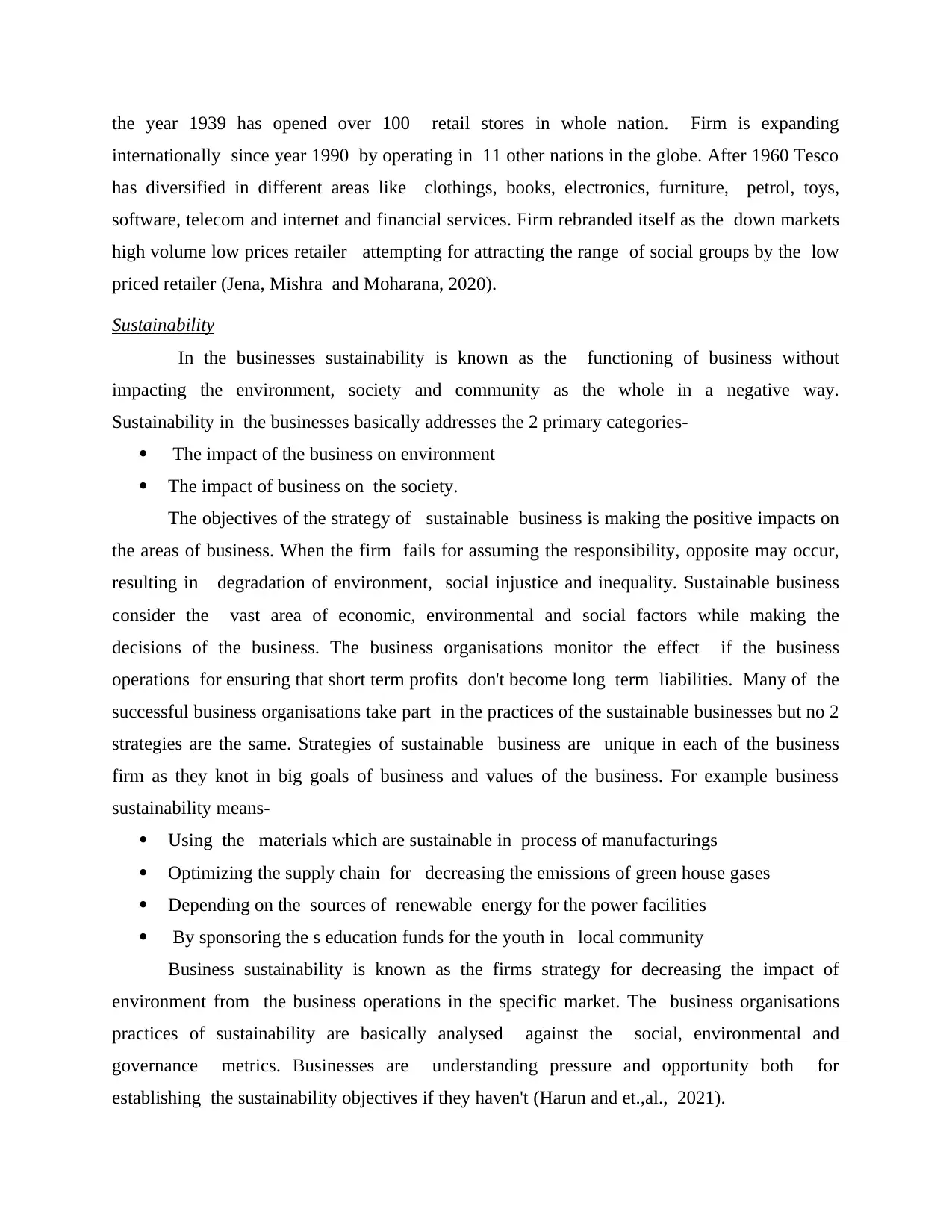
the year 1939 has opened over 100 retail stores in whole nation. Firm is expanding
internationally since year 1990 by operating in 11 other nations in the globe. After 1960 Tesco
has diversified in different areas like clothings, books, electronics, furniture, petrol, toys,
software, telecom and internet and financial services. Firm rebranded itself as the down markets
high volume low prices retailer attempting for attracting the range of social groups by the low
priced retailer (Jena, Mishra and Moharana, 2020).
Sustainability
In the businesses sustainability is known as the functioning of business without
impacting the environment, society and community as the whole in a negative way.
Sustainability in the businesses basically addresses the 2 primary categories-
The impact of the business on environment
The impact of business on the society.
The objectives of the strategy of sustainable business is making the positive impacts on
the areas of business. When the firm fails for assuming the responsibility, opposite may occur,
resulting in degradation of environment, social injustice and inequality. Sustainable business
consider the vast area of economic, environmental and social factors while making the
decisions of the business. The business organisations monitor the effect if the business
operations for ensuring that short term profits don't become long term liabilities. Many of the
successful business organisations take part in the practices of the sustainable businesses but no 2
strategies are the same. Strategies of sustainable business are unique in each of the business
firm as they knot in big goals of business and values of the business. For example business
sustainability means-
Using the materials which are sustainable in process of manufacturings
Optimizing the supply chain for decreasing the emissions of green house gases
Depending on the sources of renewable energy for the power facilities
By sponsoring the s education funds for the youth in local community
Business sustainability is known as the firms strategy for decreasing the impact of
environment from the business operations in the specific market. The business organisations
practices of sustainability are basically analysed against the social, environmental and
governance metrics. Businesses are understanding pressure and opportunity both for
establishing the sustainability objectives if they haven't (Harun and et.,al., 2021).
internationally since year 1990 by operating in 11 other nations in the globe. After 1960 Tesco
has diversified in different areas like clothings, books, electronics, furniture, petrol, toys,
software, telecom and internet and financial services. Firm rebranded itself as the down markets
high volume low prices retailer attempting for attracting the range of social groups by the low
priced retailer (Jena, Mishra and Moharana, 2020).
Sustainability
In the businesses sustainability is known as the functioning of business without
impacting the environment, society and community as the whole in a negative way.
Sustainability in the businesses basically addresses the 2 primary categories-
The impact of the business on environment
The impact of business on the society.
The objectives of the strategy of sustainable business is making the positive impacts on
the areas of business. When the firm fails for assuming the responsibility, opposite may occur,
resulting in degradation of environment, social injustice and inequality. Sustainable business
consider the vast area of economic, environmental and social factors while making the
decisions of the business. The business organisations monitor the effect if the business
operations for ensuring that short term profits don't become long term liabilities. Many of the
successful business organisations take part in the practices of the sustainable businesses but no 2
strategies are the same. Strategies of sustainable business are unique in each of the business
firm as they knot in big goals of business and values of the business. For example business
sustainability means-
Using the materials which are sustainable in process of manufacturings
Optimizing the supply chain for decreasing the emissions of green house gases
Depending on the sources of renewable energy for the power facilities
By sponsoring the s education funds for the youth in local community
Business sustainability is known as the firms strategy for decreasing the impact of
environment from the business operations in the specific market. The business organisations
practices of sustainability are basically analysed against the social, environmental and
governance metrics. Businesses are understanding pressure and opportunity both for
establishing the sustainability objectives if they haven't (Harun and et.,al., 2021).
Paraphrase This Document
Need a fresh take? Get an instant paraphrase of this document with our AI Paraphraser
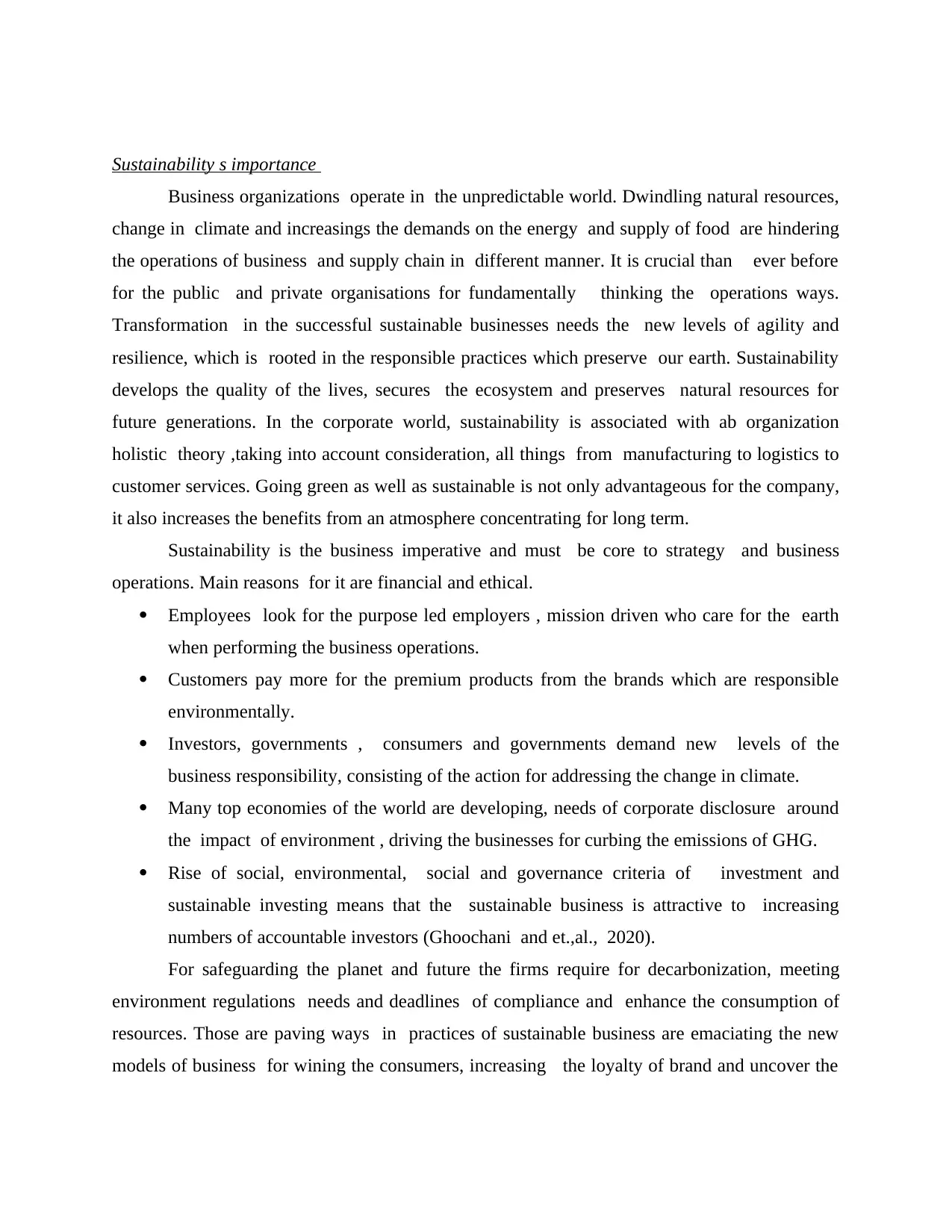
Sustainability s importance
Business organizations operate in the unpredictable world. Dwindling natural resources,
change in climate and increasings the demands on the energy and supply of food are hindering
the operations of business and supply chain in different manner. It is crucial than ever before
for the public and private organisations for fundamentally thinking the operations ways.
Transformation in the successful sustainable businesses needs the new levels of agility and
resilience, which is rooted in the responsible practices which preserve our earth. Sustainability
develops the quality of the lives, secures the ecosystem and preserves natural resources for
future generations. In the corporate world, sustainability is associated with ab organization
holistic theory ,taking into account consideration, all things from manufacturing to logistics to
customer services. Going green as well as sustainable is not only advantageous for the company,
it also increases the benefits from an atmosphere concentrating for long term.
Sustainability is the business imperative and must be core to strategy and business
operations. Main reasons for it are financial and ethical.
Employees look for the purpose led employers , mission driven who care for the earth
when performing the business operations.
Customers pay more for the premium products from the brands which are responsible
environmentally.
Investors, governments , consumers and governments demand new levels of the
business responsibility, consisting of the action for addressing the change in climate.
Many top economies of the world are developing, needs of corporate disclosure around
the impact of environment , driving the businesses for curbing the emissions of GHG.
Rise of social, environmental, social and governance criteria of investment and
sustainable investing means that the sustainable business is attractive to increasing
numbers of accountable investors (Ghoochani and et.,al., 2020).
For safeguarding the planet and future the firms require for decarbonization, meeting
environment regulations needs and deadlines of compliance and enhance the consumption of
resources. Those are paving ways in practices of sustainable business are emaciating the new
models of business for wining the consumers, increasing the loyalty of brand and uncover the
Business organizations operate in the unpredictable world. Dwindling natural resources,
change in climate and increasings the demands on the energy and supply of food are hindering
the operations of business and supply chain in different manner. It is crucial than ever before
for the public and private organisations for fundamentally thinking the operations ways.
Transformation in the successful sustainable businesses needs the new levels of agility and
resilience, which is rooted in the responsible practices which preserve our earth. Sustainability
develops the quality of the lives, secures the ecosystem and preserves natural resources for
future generations. In the corporate world, sustainability is associated with ab organization
holistic theory ,taking into account consideration, all things from manufacturing to logistics to
customer services. Going green as well as sustainable is not only advantageous for the company,
it also increases the benefits from an atmosphere concentrating for long term.
Sustainability is the business imperative and must be core to strategy and business
operations. Main reasons for it are financial and ethical.
Employees look for the purpose led employers , mission driven who care for the earth
when performing the business operations.
Customers pay more for the premium products from the brands which are responsible
environmentally.
Investors, governments , consumers and governments demand new levels of the
business responsibility, consisting of the action for addressing the change in climate.
Many top economies of the world are developing, needs of corporate disclosure around
the impact of environment , driving the businesses for curbing the emissions of GHG.
Rise of social, environmental, social and governance criteria of investment and
sustainable investing means that the sustainable business is attractive to increasing
numbers of accountable investors (Ghoochani and et.,al., 2020).
For safeguarding the planet and future the firms require for decarbonization, meeting
environment regulations needs and deadlines of compliance and enhance the consumption of
resources. Those are paving ways in practices of sustainable business are emaciating the new
models of business for wining the consumers, increasing the loyalty of brand and uncover the
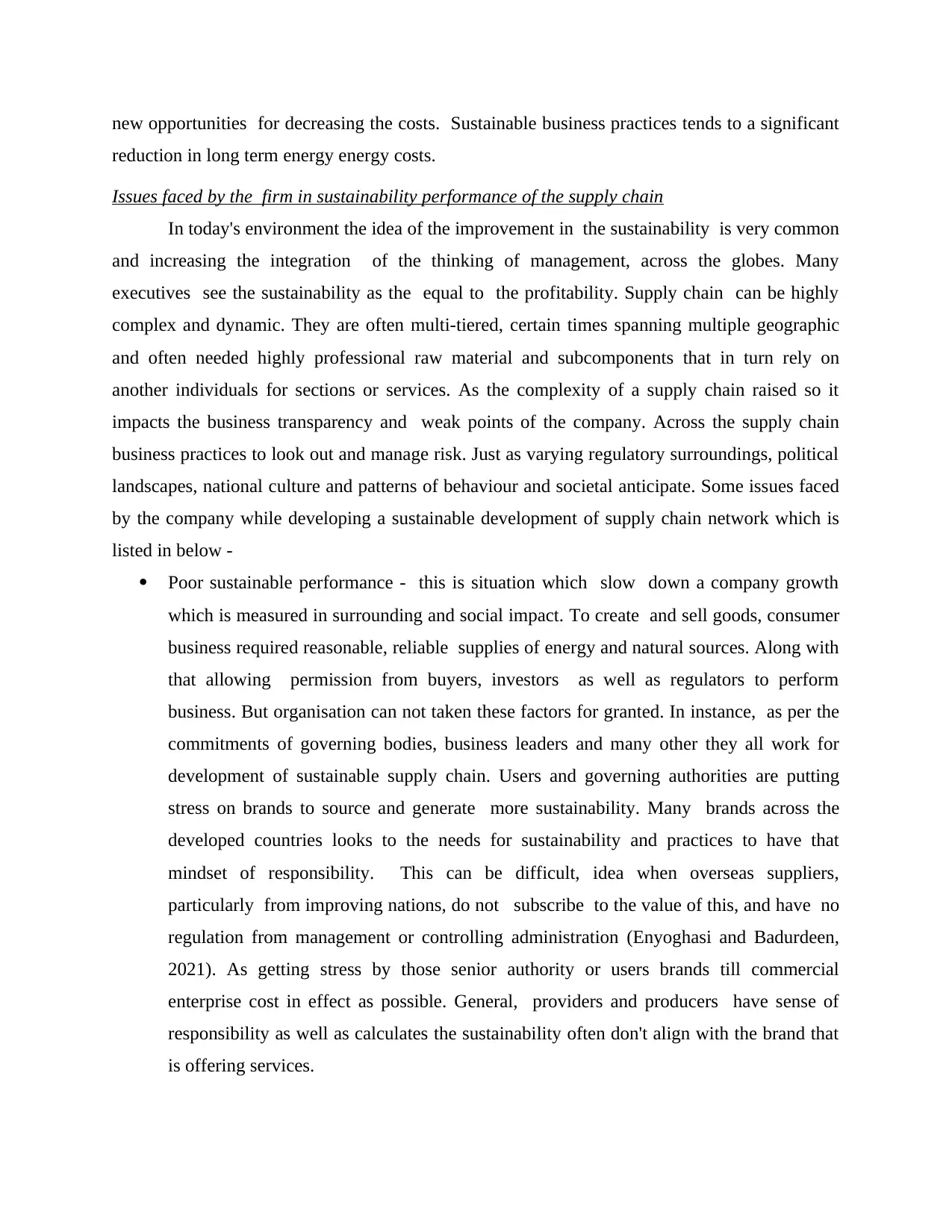
new opportunities for decreasing the costs. Sustainable business practices tends to a significant
reduction in long term energy energy costs.
Issues faced by the firm in sustainability performance of the supply chain
In today's environment the idea of the improvement in the sustainability is very common
and increasing the integration of the thinking of management, across the globes. Many
executives see the sustainability as the equal to the profitability. Supply chain can be highly
complex and dynamic. They are often multi-tiered, certain times spanning multiple geographic
and often needed highly professional raw material and subcomponents that in turn rely on
another individuals for sections or services. As the complexity of a supply chain raised so it
impacts the business transparency and weak points of the company. Across the supply chain
business practices to look out and manage risk. Just as varying regulatory surroundings, political
landscapes, national culture and patterns of behaviour and societal anticipate. Some issues faced
by the company while developing a sustainable development of supply chain network which is
listed in below -
Poor sustainable performance - this is situation which slow down a company growth
which is measured in surrounding and social impact. To create and sell goods, consumer
business required reasonable, reliable supplies of energy and natural sources. Along with
that allowing permission from buyers, investors as well as regulators to perform
business. But organisation can not taken these factors for granted. In instance, as per the
commitments of governing bodies, business leaders and many other they all work for
development of sustainable supply chain. Users and governing authorities are putting
stress on brands to source and generate more sustainability. Many brands across the
developed countries looks to the needs for sustainability and practices to have that
mindset of responsibility. This can be difficult, idea when overseas suppliers,
particularly from improving nations, do not subscribe to the value of this, and have no
regulation from management or controlling administration (Enyoghasi and Badurdeen,
2021). As getting stress by those senior authority or users brands till commercial
enterprise cost in effect as possible. General, providers and producers have sense of
responsibility as well as calculates the sustainability often don't align with the brand that
is offering services.
reduction in long term energy energy costs.
Issues faced by the firm in sustainability performance of the supply chain
In today's environment the idea of the improvement in the sustainability is very common
and increasing the integration of the thinking of management, across the globes. Many
executives see the sustainability as the equal to the profitability. Supply chain can be highly
complex and dynamic. They are often multi-tiered, certain times spanning multiple geographic
and often needed highly professional raw material and subcomponents that in turn rely on
another individuals for sections or services. As the complexity of a supply chain raised so it
impacts the business transparency and weak points of the company. Across the supply chain
business practices to look out and manage risk. Just as varying regulatory surroundings, political
landscapes, national culture and patterns of behaviour and societal anticipate. Some issues faced
by the company while developing a sustainable development of supply chain network which is
listed in below -
Poor sustainable performance - this is situation which slow down a company growth
which is measured in surrounding and social impact. To create and sell goods, consumer
business required reasonable, reliable supplies of energy and natural sources. Along with
that allowing permission from buyers, investors as well as regulators to perform
business. But organisation can not taken these factors for granted. In instance, as per the
commitments of governing bodies, business leaders and many other they all work for
development of sustainable supply chain. Users and governing authorities are putting
stress on brands to source and generate more sustainability. Many brands across the
developed countries looks to the needs for sustainability and practices to have that
mindset of responsibility. This can be difficult, idea when overseas suppliers,
particularly from improving nations, do not subscribe to the value of this, and have no
regulation from management or controlling administration (Enyoghasi and Badurdeen,
2021). As getting stress by those senior authority or users brands till commercial
enterprise cost in effect as possible. General, providers and producers have sense of
responsibility as well as calculates the sustainability often don't align with the brand that
is offering services.
⊘ This is a preview!⊘
Do you want full access?
Subscribe today to unlock all pages.

Trusted by 1+ million students worldwide
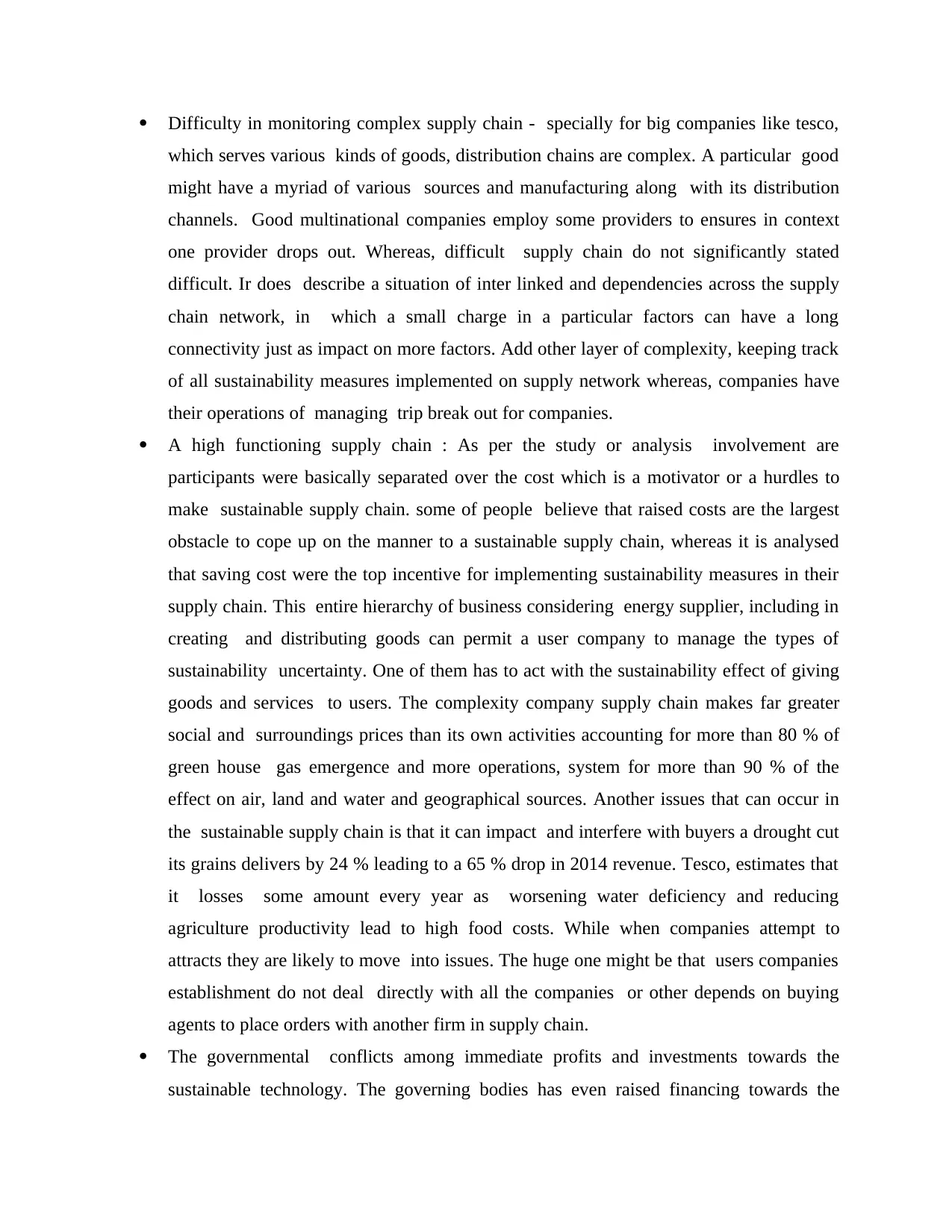
Difficulty in monitoring complex supply chain - specially for big companies like tesco,
which serves various kinds of goods, distribution chains are complex. A particular good
might have a myriad of various sources and manufacturing along with its distribution
channels. Good multinational companies employ some providers to ensures in context
one provider drops out. Whereas, difficult supply chain do not significantly stated
difficult. Ir does describe a situation of inter linked and dependencies across the supply
chain network, in which a small charge in a particular factors can have a long
connectivity just as impact on more factors. Add other layer of complexity, keeping track
of all sustainability measures implemented on supply network whereas, companies have
their operations of managing trip break out for companies.
A high functioning supply chain : As per the study or analysis involvement are
participants were basically separated over the cost which is a motivator or a hurdles to
make sustainable supply chain. some of people believe that raised costs are the largest
obstacle to cope up on the manner to a sustainable supply chain, whereas it is analysed
that saving cost were the top incentive for implementing sustainability measures in their
supply chain. This entire hierarchy of business considering energy supplier, including in
creating and distributing goods can permit a user company to manage the types of
sustainability uncertainty. One of them has to act with the sustainability effect of giving
goods and services to users. The complexity company supply chain makes far greater
social and surroundings prices than its own activities accounting for more than 80 % of
green house gas emergence and more operations, system for more than 90 % of the
effect on air, land and water and geographical sources. Another issues that can occur in
the sustainable supply chain is that it can impact and interfere with buyers a drought cut
its grains delivers by 24 % leading to a 65 % drop in 2014 revenue. Tesco, estimates that
it losses some amount every year as worsening water deficiency and reducing
agriculture productivity lead to high food costs. While when companies attempt to
attracts they are likely to move into issues. The huge one might be that users companies
establishment do not deal directly with all the companies or other depends on buying
agents to place orders with another firm in supply chain.
The governmental conflicts among immediate profits and investments towards the
sustainable technology. The governing bodies has even raised financing towards the
which serves various kinds of goods, distribution chains are complex. A particular good
might have a myriad of various sources and manufacturing along with its distribution
channels. Good multinational companies employ some providers to ensures in context
one provider drops out. Whereas, difficult supply chain do not significantly stated
difficult. Ir does describe a situation of inter linked and dependencies across the supply
chain network, in which a small charge in a particular factors can have a long
connectivity just as impact on more factors. Add other layer of complexity, keeping track
of all sustainability measures implemented on supply network whereas, companies have
their operations of managing trip break out for companies.
A high functioning supply chain : As per the study or analysis involvement are
participants were basically separated over the cost which is a motivator or a hurdles to
make sustainable supply chain. some of people believe that raised costs are the largest
obstacle to cope up on the manner to a sustainable supply chain, whereas it is analysed
that saving cost were the top incentive for implementing sustainability measures in their
supply chain. This entire hierarchy of business considering energy supplier, including in
creating and distributing goods can permit a user company to manage the types of
sustainability uncertainty. One of them has to act with the sustainability effect of giving
goods and services to users. The complexity company supply chain makes far greater
social and surroundings prices than its own activities accounting for more than 80 % of
green house gas emergence and more operations, system for more than 90 % of the
effect on air, land and water and geographical sources. Another issues that can occur in
the sustainable supply chain is that it can impact and interfere with buyers a drought cut
its grains delivers by 24 % leading to a 65 % drop in 2014 revenue. Tesco, estimates that
it losses some amount every year as worsening water deficiency and reducing
agriculture productivity lead to high food costs. While when companies attempt to
attracts they are likely to move into issues. The huge one might be that users companies
establishment do not deal directly with all the companies or other depends on buying
agents to place orders with another firm in supply chain.
The governmental conflicts among immediate profits and investments towards the
sustainable technology. The governing bodies has even raised financing towards the
Paraphrase This Document
Need a fresh take? Get an instant paraphrase of this document with our AI Paraphraser
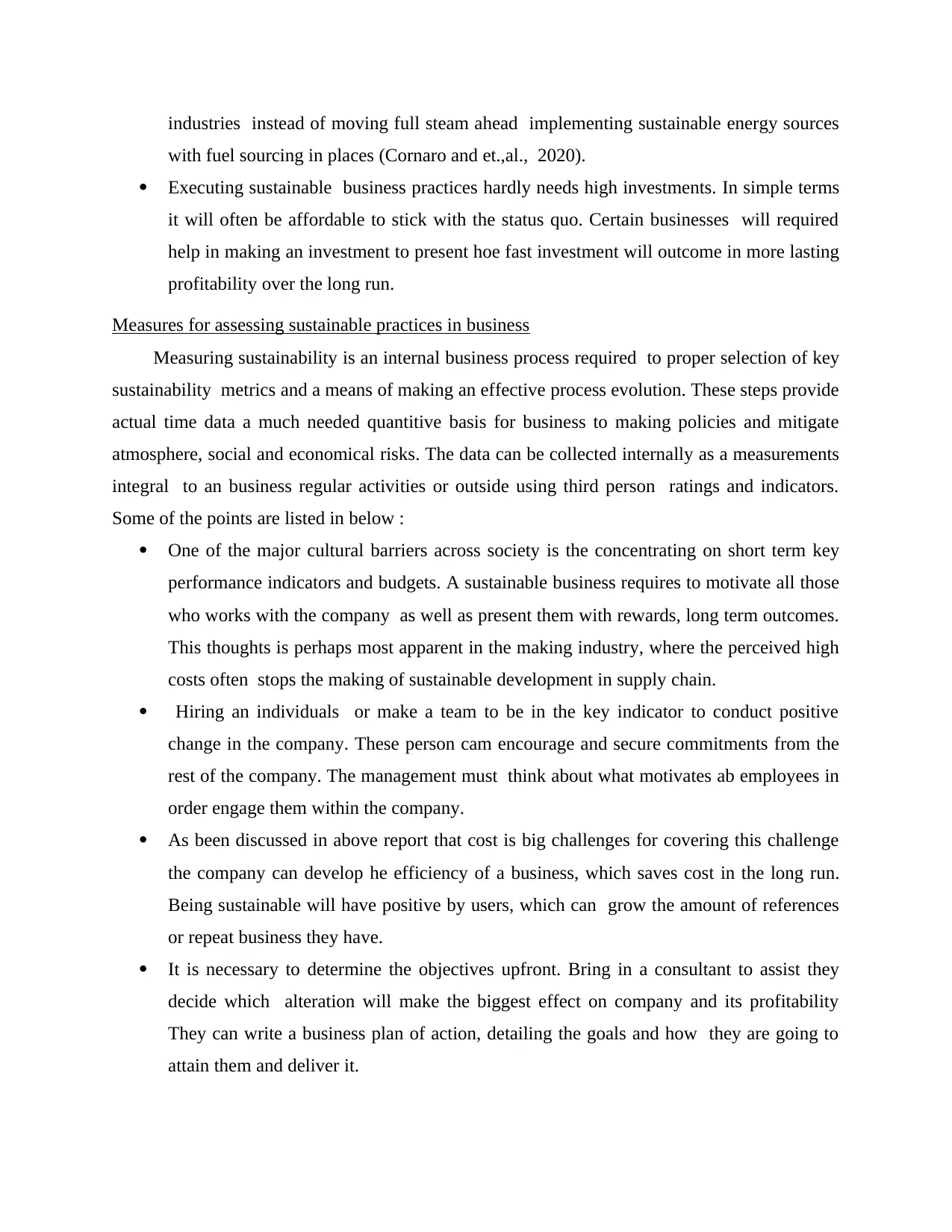
industries instead of moving full steam ahead implementing sustainable energy sources
with fuel sourcing in places (Cornaro and et.,al., 2020).
Executing sustainable business practices hardly needs high investments. In simple terms
it will often be affordable to stick with the status quo. Certain businesses will required
help in making an investment to present hoe fast investment will outcome in more lasting
profitability over the long run.
Measures for assessing sustainable practices in business
Measuring sustainability is an internal business process required to proper selection of key
sustainability metrics and a means of making an effective process evolution. These steps provide
actual time data a much needed quantitive basis for business to making policies and mitigate
atmosphere, social and economical risks. The data can be collected internally as a measurements
integral to an business regular activities or outside using third person ratings and indicators.
Some of the points are listed in below :
One of the major cultural barriers across society is the concentrating on short term key
performance indicators and budgets. A sustainable business requires to motivate all those
who works with the company as well as present them with rewards, long term outcomes.
This thoughts is perhaps most apparent in the making industry, where the perceived high
costs often stops the making of sustainable development in supply chain.
Hiring an individuals or make a team to be in the key indicator to conduct positive
change in the company. These person cam encourage and secure commitments from the
rest of the company. The management must think about what motivates ab employees in
order engage them within the company.
As been discussed in above report that cost is big challenges for covering this challenge
the company can develop he efficiency of a business, which saves cost in the long run.
Being sustainable will have positive by users, which can grow the amount of references
or repeat business they have.
It is necessary to determine the objectives upfront. Bring in a consultant to assist they
decide which alteration will make the biggest effect on company and its profitability
They can write a business plan of action, detailing the goals and how they are going to
attain them and deliver it.
with fuel sourcing in places (Cornaro and et.,al., 2020).
Executing sustainable business practices hardly needs high investments. In simple terms
it will often be affordable to stick with the status quo. Certain businesses will required
help in making an investment to present hoe fast investment will outcome in more lasting
profitability over the long run.
Measures for assessing sustainable practices in business
Measuring sustainability is an internal business process required to proper selection of key
sustainability metrics and a means of making an effective process evolution. These steps provide
actual time data a much needed quantitive basis for business to making policies and mitigate
atmosphere, social and economical risks. The data can be collected internally as a measurements
integral to an business regular activities or outside using third person ratings and indicators.
Some of the points are listed in below :
One of the major cultural barriers across society is the concentrating on short term key
performance indicators and budgets. A sustainable business requires to motivate all those
who works with the company as well as present them with rewards, long term outcomes.
This thoughts is perhaps most apparent in the making industry, where the perceived high
costs often stops the making of sustainable development in supply chain.
Hiring an individuals or make a team to be in the key indicator to conduct positive
change in the company. These person cam encourage and secure commitments from the
rest of the company. The management must think about what motivates ab employees in
order engage them within the company.
As been discussed in above report that cost is big challenges for covering this challenge
the company can develop he efficiency of a business, which saves cost in the long run.
Being sustainable will have positive by users, which can grow the amount of references
or repeat business they have.
It is necessary to determine the objectives upfront. Bring in a consultant to assist they
decide which alteration will make the biggest effect on company and its profitability
They can write a business plan of action, detailing the goals and how they are going to
attain them and deliver it.
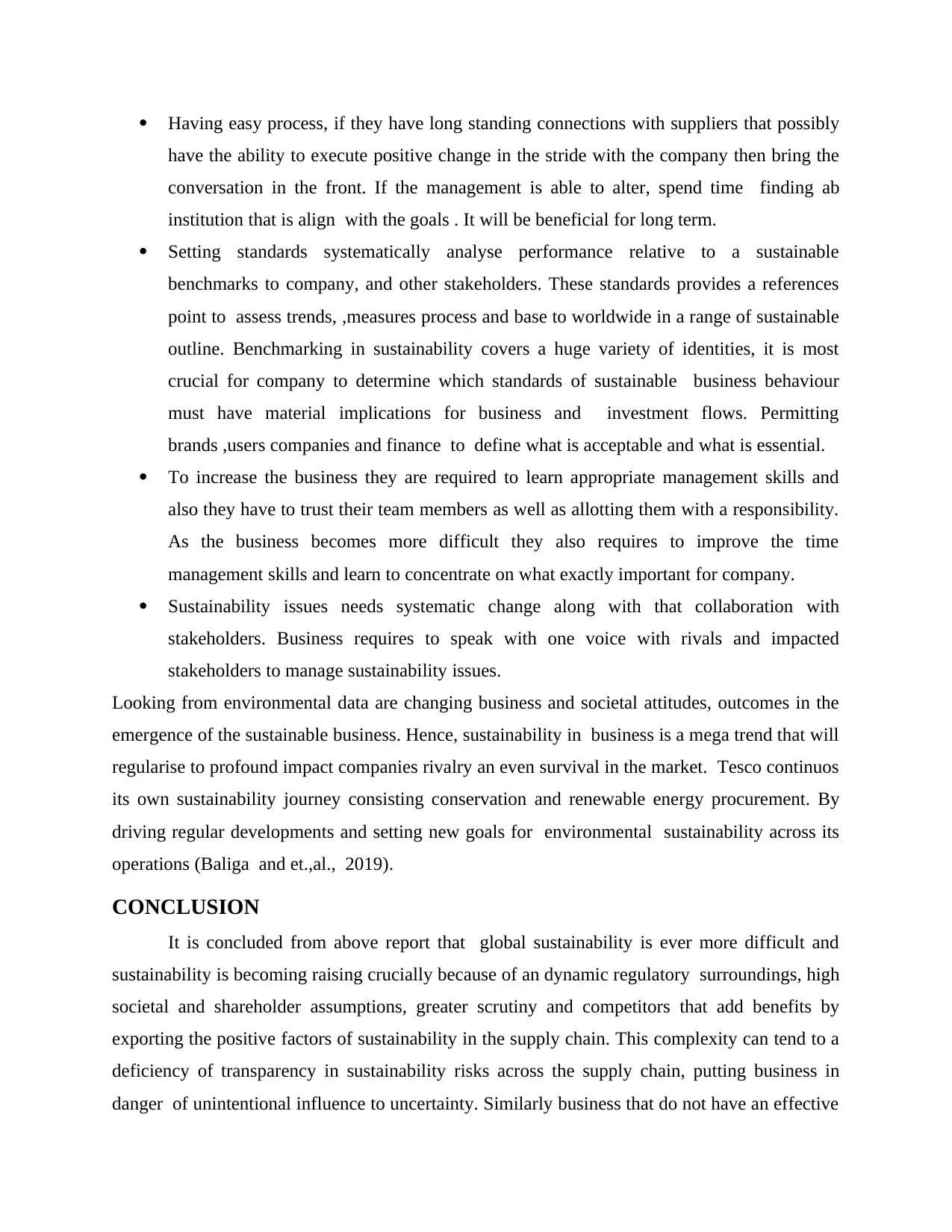
Having easy process, if they have long standing connections with suppliers that possibly
have the ability to execute positive change in the stride with the company then bring the
conversation in the front. If the management is able to alter, spend time finding ab
institution that is align with the goals . It will be beneficial for long term.
Setting standards systematically analyse performance relative to a sustainable
benchmarks to company, and other stakeholders. These standards provides a references
point to assess trends, ,measures process and base to worldwide in a range of sustainable
outline. Benchmarking in sustainability covers a huge variety of identities, it is most
crucial for company to determine which standards of sustainable business behaviour
must have material implications for business and investment flows. Permitting
brands ,users companies and finance to define what is acceptable and what is essential.
To increase the business they are required to learn appropriate management skills and
also they have to trust their team members as well as allotting them with a responsibility.
As the business becomes more difficult they also requires to improve the time
management skills and learn to concentrate on what exactly important for company.
Sustainability issues needs systematic change along with that collaboration with
stakeholders. Business requires to speak with one voice with rivals and impacted
stakeholders to manage sustainability issues.
Looking from environmental data are changing business and societal attitudes, outcomes in the
emergence of the sustainable business. Hence, sustainability in business is a mega trend that will
regularise to profound impact companies rivalry an even survival in the market. Tesco continuos
its own sustainability journey consisting conservation and renewable energy procurement. By
driving regular developments and setting new goals for environmental sustainability across its
operations (Baliga and et.,al., 2019).
CONCLUSION
It is concluded from above report that global sustainability is ever more difficult and
sustainability is becoming raising crucially because of an dynamic regulatory surroundings, high
societal and shareholder assumptions, greater scrutiny and competitors that add benefits by
exporting the positive factors of sustainability in the supply chain. This complexity can tend to a
deficiency of transparency in sustainability risks across the supply chain, putting business in
danger of unintentional influence to uncertainty. Similarly business that do not have an effective
have the ability to execute positive change in the stride with the company then bring the
conversation in the front. If the management is able to alter, spend time finding ab
institution that is align with the goals . It will be beneficial for long term.
Setting standards systematically analyse performance relative to a sustainable
benchmarks to company, and other stakeholders. These standards provides a references
point to assess trends, ,measures process and base to worldwide in a range of sustainable
outline. Benchmarking in sustainability covers a huge variety of identities, it is most
crucial for company to determine which standards of sustainable business behaviour
must have material implications for business and investment flows. Permitting
brands ,users companies and finance to define what is acceptable and what is essential.
To increase the business they are required to learn appropriate management skills and
also they have to trust their team members as well as allotting them with a responsibility.
As the business becomes more difficult they also requires to improve the time
management skills and learn to concentrate on what exactly important for company.
Sustainability issues needs systematic change along with that collaboration with
stakeholders. Business requires to speak with one voice with rivals and impacted
stakeholders to manage sustainability issues.
Looking from environmental data are changing business and societal attitudes, outcomes in the
emergence of the sustainable business. Hence, sustainability in business is a mega trend that will
regularise to profound impact companies rivalry an even survival in the market. Tesco continuos
its own sustainability journey consisting conservation and renewable energy procurement. By
driving regular developments and setting new goals for environmental sustainability across its
operations (Baliga and et.,al., 2019).
CONCLUSION
It is concluded from above report that global sustainability is ever more difficult and
sustainability is becoming raising crucially because of an dynamic regulatory surroundings, high
societal and shareholder assumptions, greater scrutiny and competitors that add benefits by
exporting the positive factors of sustainability in the supply chain. This complexity can tend to a
deficiency of transparency in sustainability risks across the supply chain, putting business in
danger of unintentional influence to uncertainty. Similarly business that do not have an effective
⊘ This is a preview!⊘
Do you want full access?
Subscribe today to unlock all pages.

Trusted by 1+ million students worldwide
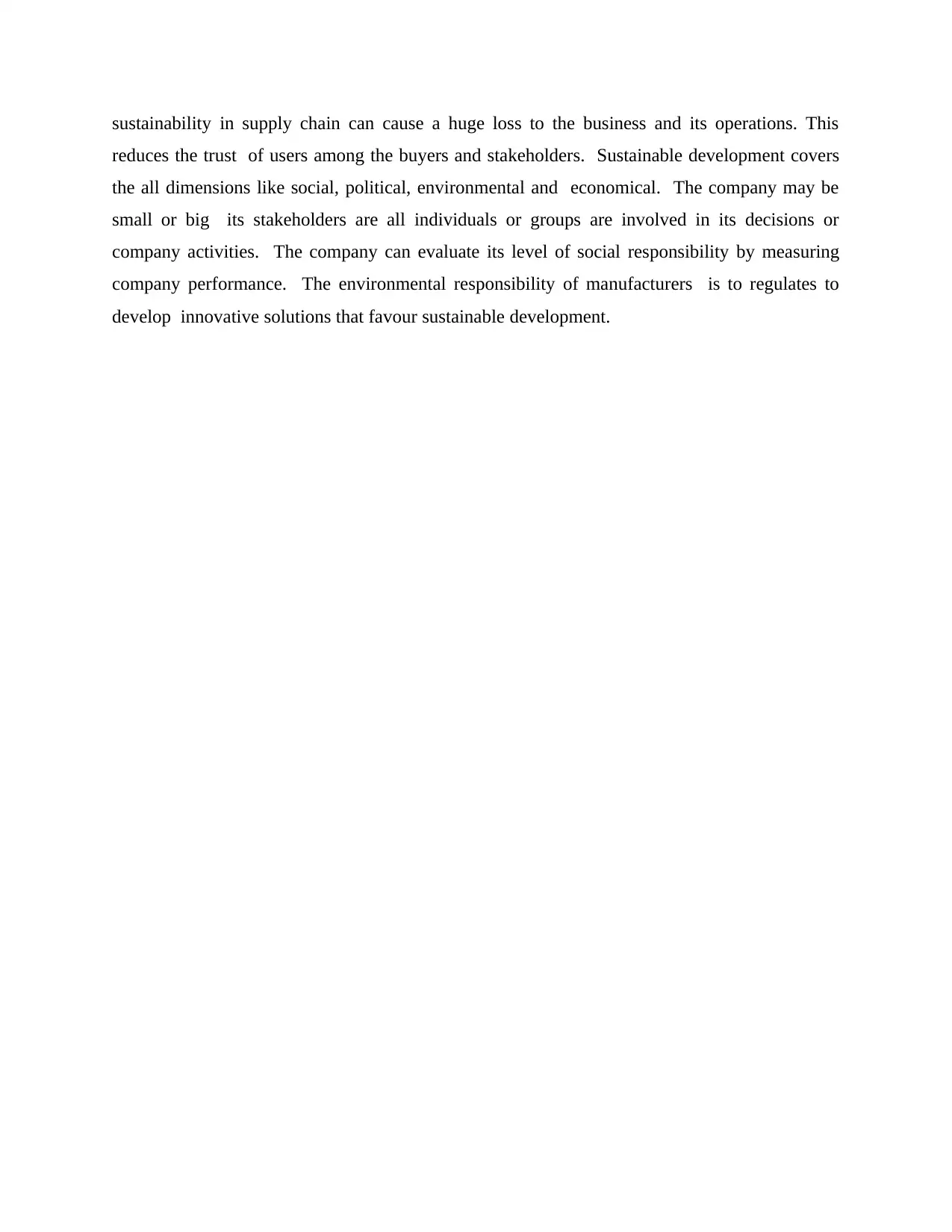
sustainability in supply chain can cause a huge loss to the business and its operations. This
reduces the trust of users among the buyers and stakeholders. Sustainable development covers
the all dimensions like social, political, environmental and economical. The company may be
small or big its stakeholders are all individuals or groups are involved in its decisions or
company activities. The company can evaluate its level of social responsibility by measuring
company performance. The environmental responsibility of manufacturers is to regulates to
develop innovative solutions that favour sustainable development.
reduces the trust of users among the buyers and stakeholders. Sustainable development covers
the all dimensions like social, political, environmental and economical. The company may be
small or big its stakeholders are all individuals or groups are involved in its decisions or
company activities. The company can evaluate its level of social responsibility by measuring
company performance. The environmental responsibility of manufacturers is to regulates to
develop innovative solutions that favour sustainable development.
Paraphrase This Document
Need a fresh take? Get an instant paraphrase of this document with our AI Paraphraser
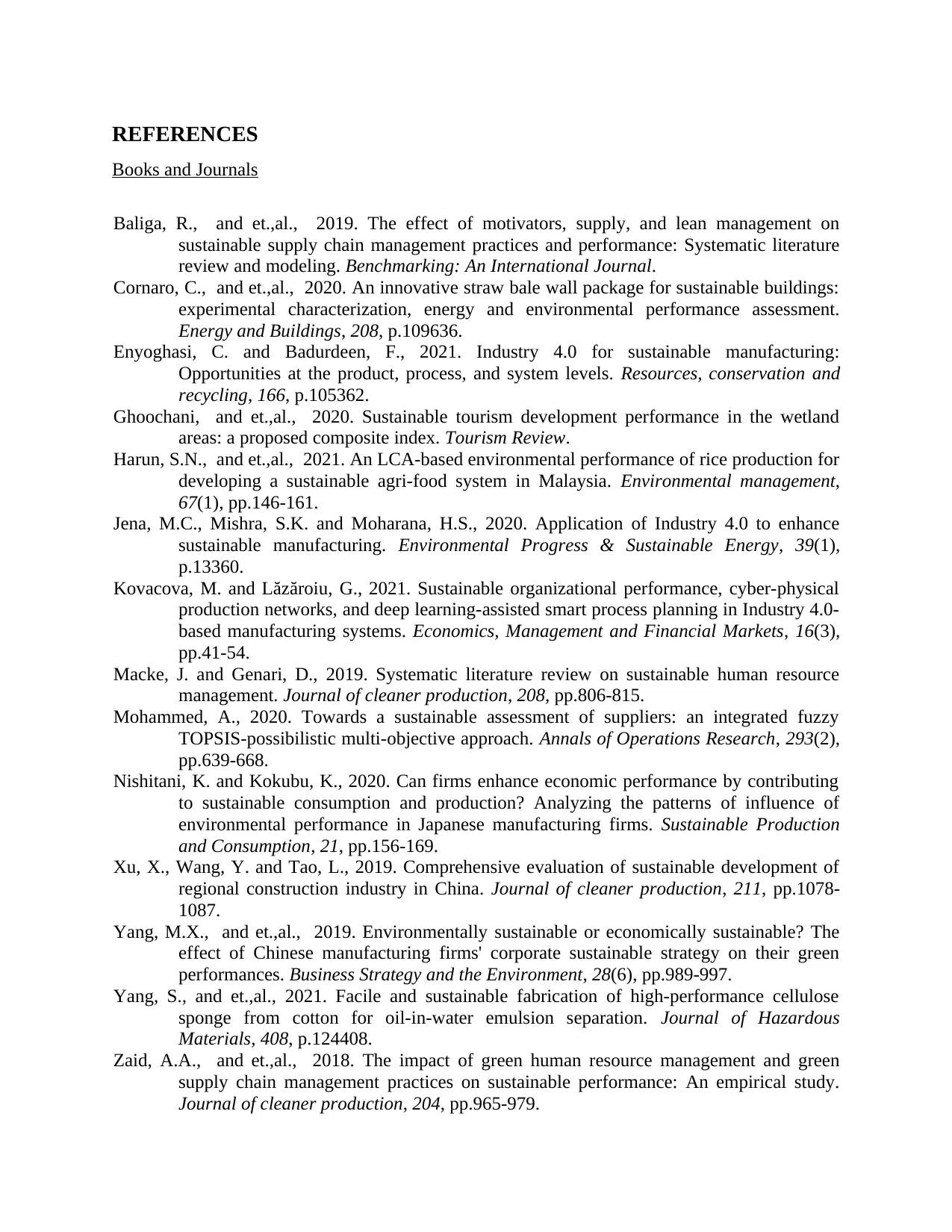
REFERENCES
Books and Journals
Baliga, R., and et.,al., 2019. The effect of motivators, supply, and lean management on
sustainable supply chain management practices and performance: Systematic literature
review and modeling. Benchmarking: An International Journal.
Cornaro, C., and et.,al., 2020. An innovative straw bale wall package for sustainable buildings:
experimental characterization, energy and environmental performance assessment.
Energy and Buildings, 208, p.109636.
Enyoghasi, C. and Badurdeen, F., 2021. Industry 4.0 for sustainable manufacturing:
Opportunities at the product, process, and system levels. Resources, conservation and
recycling, 166, p.105362.
Ghoochani, and et.,al., 2020. Sustainable tourism development performance in the wetland
areas: a proposed composite index. Tourism Review.
Harun, S.N., and et.,al., 2021. An LCA-based environmental performance of rice production for
developing a sustainable agri-food system in Malaysia. Environmental management,
67(1), pp.146-161.
Jena, M.C., Mishra, S.K. and Moharana, H.S., 2020. Application of Industry 4.0 to enhance
sustainable manufacturing. Environmental Progress & Sustainable Energy, 39(1),
p.13360.
Kovacova, M. and Lăzăroiu, G., 2021. Sustainable organizational performance, cyber-physical
production networks, and deep learning-assisted smart process planning in Industry 4.0-
based manufacturing systems. Economics, Management and Financial Markets, 16(3),
pp.41-54.
Macke, J. and Genari, D., 2019. Systematic literature review on sustainable human resource
management. Journal of cleaner production, 208, pp.806-815.
Mohammed, A., 2020. Towards a sustainable assessment of suppliers: an integrated fuzzy
TOPSIS-possibilistic multi-objective approach. Annals of Operations Research, 293(2),
pp.639-668.
Nishitani, K. and Kokubu, K., 2020. Can firms enhance economic performance by contributing
to sustainable consumption and production? Analyzing the patterns of influence of
environmental performance in Japanese manufacturing firms. Sustainable Production
and Consumption, 21, pp.156-169.
Xu, X., Wang, Y. and Tao, L., 2019. Comprehensive evaluation of sustainable development of
regional construction industry in China. Journal of cleaner production, 211, pp.1078-
1087.
Yang, M.X., and et.,al., 2019. Environmentally sustainable or economically sustainable? The
effect of Chinese manufacturing firms' corporate sustainable strategy on their green
performances. Business Strategy and the Environment, 28(6), pp.989-997.
Yang, S., and et.,al., 2021. Facile and sustainable fabrication of high-performance cellulose
sponge from cotton for oil-in-water emulsion separation. Journal of Hazardous
Materials, 408, p.124408.
Zaid, A.A., and et.,al., 2018. The impact of green human resource management and green
supply chain management practices on sustainable performance: An empirical study.
Journal of cleaner production, 204, pp.965-979.
Books and Journals
Baliga, R., and et.,al., 2019. The effect of motivators, supply, and lean management on
sustainable supply chain management practices and performance: Systematic literature
review and modeling. Benchmarking: An International Journal.
Cornaro, C., and et.,al., 2020. An innovative straw bale wall package for sustainable buildings:
experimental characterization, energy and environmental performance assessment.
Energy and Buildings, 208, p.109636.
Enyoghasi, C. and Badurdeen, F., 2021. Industry 4.0 for sustainable manufacturing:
Opportunities at the product, process, and system levels. Resources, conservation and
recycling, 166, p.105362.
Ghoochani, and et.,al., 2020. Sustainable tourism development performance in the wetland
areas: a proposed composite index. Tourism Review.
Harun, S.N., and et.,al., 2021. An LCA-based environmental performance of rice production for
developing a sustainable agri-food system in Malaysia. Environmental management,
67(1), pp.146-161.
Jena, M.C., Mishra, S.K. and Moharana, H.S., 2020. Application of Industry 4.0 to enhance
sustainable manufacturing. Environmental Progress & Sustainable Energy, 39(1),
p.13360.
Kovacova, M. and Lăzăroiu, G., 2021. Sustainable organizational performance, cyber-physical
production networks, and deep learning-assisted smart process planning in Industry 4.0-
based manufacturing systems. Economics, Management and Financial Markets, 16(3),
pp.41-54.
Macke, J. and Genari, D., 2019. Systematic literature review on sustainable human resource
management. Journal of cleaner production, 208, pp.806-815.
Mohammed, A., 2020. Towards a sustainable assessment of suppliers: an integrated fuzzy
TOPSIS-possibilistic multi-objective approach. Annals of Operations Research, 293(2),
pp.639-668.
Nishitani, K. and Kokubu, K., 2020. Can firms enhance economic performance by contributing
to sustainable consumption and production? Analyzing the patterns of influence of
environmental performance in Japanese manufacturing firms. Sustainable Production
and Consumption, 21, pp.156-169.
Xu, X., Wang, Y. and Tao, L., 2019. Comprehensive evaluation of sustainable development of
regional construction industry in China. Journal of cleaner production, 211, pp.1078-
1087.
Yang, M.X., and et.,al., 2019. Environmentally sustainable or economically sustainable? The
effect of Chinese manufacturing firms' corporate sustainable strategy on their green
performances. Business Strategy and the Environment, 28(6), pp.989-997.
Yang, S., and et.,al., 2021. Facile and sustainable fabrication of high-performance cellulose
sponge from cotton for oil-in-water emulsion separation. Journal of Hazardous
Materials, 408, p.124408.
Zaid, A.A., and et.,al., 2018. The impact of green human resource management and green
supply chain management practices on sustainable performance: An empirical study.
Journal of cleaner production, 204, pp.965-979.

⊘ This is a preview!⊘
Do you want full access?
Subscribe today to unlock all pages.

Trusted by 1+ million students worldwide
1 out of 12
Related Documents
Your All-in-One AI-Powered Toolkit for Academic Success.
+13062052269
info@desklib.com
Available 24*7 on WhatsApp / Email
![[object Object]](/_next/static/media/star-bottom.7253800d.svg)
Unlock your academic potential
Copyright © 2020–2025 A2Z Services. All Rights Reserved. Developed and managed by ZUCOL.





